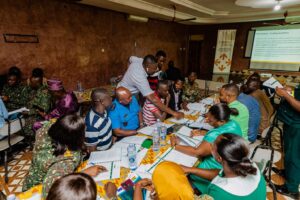The International Centre for Migration Policy Development (ICMPD), implementors of the Strengthening Border Security Ghana project, has organized a three-day workshop to train border management institutions and agencies in Contingency Planning and Emergency Response.
The workshop, held at the Gonokrom Sector Command in the Dormaa District of the Bono Region, brought together over 60 representatives from various agencies and stakeholders, including the Ghana Immigration Service (GIS), Ghana Revenue Authority – Customs Division (GRA-CD), Ghana Police Service (GPS), National Ambulance Service (NAS), National Intelligence Bureau (NIB), Port Health, Ghana Health Service (GHS), Ghana National Fire Service (GNFS), Narcotics Control Commission (NACOC), National Disaster Management Organisation (NADMO), Defence Intelligence, Dormaa Central District Assembly and Local Authorities.

The training focused on equipping the Ghana Immigration Service (GIS) and other key border management agencies with the necessary skills to effectively handle emergencies at Ghana’s borders. The workshop assessed the readiness and coordination of participating agencies in responding to various emergency scenarios.
The comprehensive training integrated theoretical sessions and simulation activities, equipping participants with hands-on expertise in contingency planning, emergency response, and crisis management.
The exercises underscored the importance of interagency collaboration, demonstrating how GIS works together with other border management agencies to maintain effective operations during crises. Furthermore, the training explored comprehensive strategies for minimizing the impacts of emergencies that could compromise the service’s functionality, promoting a unified approach to emergency management.
Essential areas such as risk assessment, emergency response planning, and crisis communication were covered. Through a combination of theoretical sessions and simulation exercises, participants were challenged to respond to scenarios like mass influx of persons, health crises, and terrorist threats, testing their ability to react effectively.
Iulia Jolley-Socea, Project Manager of the SBS Project and ICMPD Ghana, highlighted the significance of the exercise, stating “ The time to fix the roof is when the sun is shining. The SBS project in Ghana is directed at implementing activities that help to contribute to strengthening the capacity mainly of the Ghana Immigration Service to address cross- border crimes and border security challenges. Part of this effort is to support the GIS in coordinating with other agencies or institutions that may at different times have a goal in also safeguarding Ghana’s borders.”
Ms. Socea also emphasized that the country’s ability to manage and respond to emergencies depends heavily on its preparedness and collaboration with stakeholders.
The SBS Project in Ghana is a joint initiative between ICMPD and GIS, funded by the European Union’s Emergency Funding for Africa. The SBS project is committed to strengthening Ghana’s national emergency response framework, positioning GIS as a forward-thinking institution ready to handle any contingency that may arise.
The International Centre for Migration Policy Development (ICMPD) is an international organization with 20 Member States and 498 staff members. Active in more than 90 countries worldwide, it takes a regional approach in its work to create efficient cooperation and partnerships along migration routes. Priority regions include Africa, Eastern Europe, Central Asia, Mediterranean, Silk Routes, Western Balkans and Türkiye.
The Strengthening Border Security (SBS) Ghana project is a comprehensive initiative aimed at enhancing the country’s border security and migration management. In line with government’s migration policy, SBS Ghana strives to implement a forward-thinking and sustainable migration management framework that drives national progress and prosperity.
The project is designed to strengthen cooperation and coordination among national agencies, academic institutions, and civil society organizations working in the area of migration.










